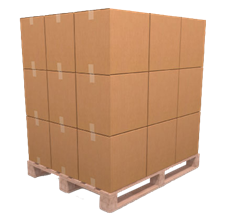
LTL shipping refers to the process of transporting relatively small freight shipments that weigh anywhere between 150 to 10,000 lbs. Unlike Full Truck Load (FTL) prices, which are usually based on a more simplistic rate per mile system, LTL rates are calculated from several variable factors. Knowing these factors can be helpful in setting more realistic expectations and increasing long-term savings. Here are some factors used to determine LTL freight shipping rates:
Weight & Density
These two basic aspects of your shipment greatly determine how much you will be charged. Freight companies generally rate shipments at the lowest weight category and rate, meaning that the more a shipment weighs the less it costs per hundred pounds. Weight is also used to calculate density, and is one of the main components used to determine the classification of the shipment, which in turn affects the final rate. Logistics Plus provides a helpful, online freight density calculator if you want to quickly know the density of your shipment.
Freight Classification
The National Motor Freight Traffic Association (NMFTA) has established “freight classes” which are used to classify commodities for rating purposes. Classifications are based on the products’ density, stow-ability, value, handling and liability. Each commodity is categorized into one of 18 different freight classifications. Generally, the lower the freight class, the more dense the commodity, and, therefore, the lower the rate per hundred pounds. You can read more about freight classification on the Logistics Plus website.
Origin and Destination
Shipments that need to travel farther usually have higher rates as well. Shippers should find out which LTL carriers serve their intended destination to avoid interlining; a practice where one LTL carrier resorts to transferring its shipments to other carriers due to their limited reach. Interline shipments often tend to cost more and are more susceptible to loss or damage. Also shipments that require additional time or special equipment at time of pickup or delivery may also incur additional fees (called “accessorial fees” as discussed below). Examples include pickups or deliveries to residential locations, convention centers, construction sites, airports, wharfs, or container freight stations.
Base Rates
Ever since the industry was deregulated in the early 1980s, LTL carriers set their own base rates (i.e.,”list price”) from which discounts can be negotiated. Base rates can vary by company and by lane, making true apples-to-apples rate comparisons very difficult unless you know what you are doing. Logistics Plus provides shippers with the ability to request a free freight analysis if you’re unsure on how to compare rates to ensure you’re getting the best possible deal.
Absolute Minimum Charges
These are the minimum prices charged by LTL carriers, below which they will not go any lower – no matter what discounts may have been negotiated. The absolute minimum charge (MC) helps ensure carriers cover all of their fixed costs on a particular shipment or lane. If a high percentage of your shipments are small, or move across short distances, absolute minimum charges may play an important factor in your overall transportation spend.
Accessorial Fees
Accessorial fees apply when additional services are required to handle your shipment – those above and beyond the typical dock-to-dock pickup and delivery service most LTL carriers provide. Common examples include liftgate service, weekend delivery, and pickup or delivery at special origin and destination locations (as noted above). Fuel surcharges are the most common accessorial fee that LTL carriers charge since they are typically included on every shipment. Often times specific accessorial charges can be waived or reduced, so it’s important to understand how these fees impact your overall expenses and then include them in your negotiations.
Negotiating Rates
Shippers can save money on their LTL freight spend by negotiating base rates, discounts, and minimum charges with their LTL carriers. Alternatively, a professional freight management company, such as Logistics Plus, can negotiate with LTL carriers on your behalf. Top freight management companies are able to leverage their collective buying clout, analytical expertise, and carrier relationships to provide even greater savings to shippers, particularly those that are small or mid-sized companies.
If you feel like you’re spending too much on LTL freight, or if you lack the resources or expertise to negotiate your own rates, please consider working with Logistics Plus. As a top 50 freight brokerage firm, our LTL experts help hundreds of companies save on their LTL shipping every day. As mentioned earlier, we can provide you with a no-obligation freight analysis for multiple shipments, or we can help you get a quick and accurate freight quote for a single shipment.


